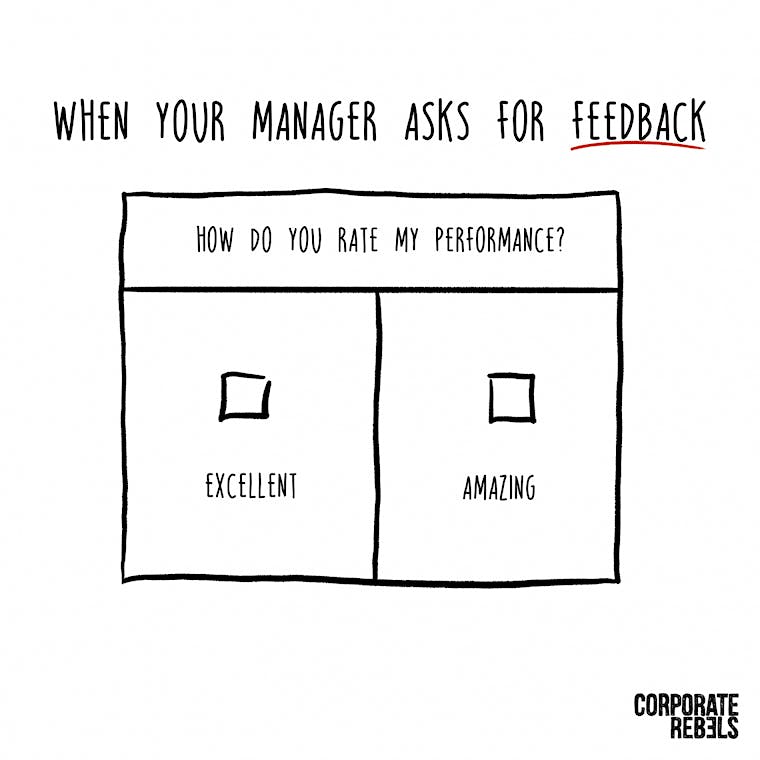When Your Manager Asks For Feedback...

Most companies still rely exclusively on top-down evaluations, where managers assess the performance of their subordinates—which also typically influences the decision on issues like pay raises. However, a growing number of companies are changing things up by inviting employees to assess their managers. Sadly, most of these approaches are kinda shitty and ineffective.

When you are asked to give feedback to your manager, that sounds like a really nice thing to do. And it generally is.
But when moving towards bottom-up feedback, 360-feedback, or anything of that sort, there's always one big fat obstacle: In most companies, the power balance between manager and employee is way too uneven for any honest conversations to occur.
Suppose you know that that person is also going to be the one deciding on your promotion, salary level, roles, responsibilities, and so on. In that case, you will probably think twice before sharing the most sincere (and often uncomfortable) pieces of feedback.
So what’s the point of even trying?
Tips from the progressives
This uneven power dynamic doesn't mean you should forgo the good intentions of bottom-up feedback; there are several ways to make it work. Let's examine some approaches used by the most progressive organizations in the world.
Spoiler alert: they're all about creating a safe space. Bear with us.
1. Keep it simple
Forget about those overly complex methods of giving feedback—there’s no need to dive into the mass of fancy-looking feedback tools.
Instead, just use Netflix's simple yet powerful approach to feedback by asking three simple questions:
- What should I stop?
- What should I start?
- What should I continue?
Pretty easy and to the point, right?
2. Anonymize the input
If you're not used to having such deep and personal feedback conversations yet, anonymity can be the avenue to help get you started. Simply gather anonymous input from the entire team to ensure that feedback is honest and transparent.
Take into account that some people may still be hesitant in being completely honest. And do take your time. Show that you're really doing this to become a better leader and create a better team. Keep at it, show your sincerity, and you'll come a long way.
Besides, it's better to have anonymous honest feedback than no honesty at all. Even if it results in most of the team shitting on you for your deficiencies. And even if some of it is relatively trivial. It’s still how they feel, and it matters. And it’s your job to take it into account.
(If at any time you and the rest of the team feel comfortable enough to ditch the anonymity, then go for it! You've just reached the advanced level.)
3. Be transparent
As a leader, you should be transparent and actually share the feedback you've received. Show that you're doing this to become a better leader. Naturally, this means sharing what actions you're going to take to improve.
Without such transparency (which is painfully common in many of today's 360-degree feedback scenarios), people lose trust in the process. They'll eventually feel like their input is not appreciated or taken into account, so why should they even bother putting their ass on the line?
Think about it. If everyone fills out an anonymous feedback form and never hears about it again after, how will anyone know for sure that their voices were heard and acknowledged? It’s only going to make any existing problems worse.
4. Get help
You can create an even greater feeling of a safe space by inviting a facilitator to guide feedback conversations. It always helps to have a completely neutral(!) party involved, making it easier for both parties to be honest, comfortable, and, most importantly, constructive.
5. Decouple feedback and assessments
To reduce the uncomfortable connection between bottom-up feedback and salary increases or promotions, it's a good idea to decouple the feedback conversation from any form of yearly performance assessment (if you still have those in place).
This small change of splitting up the tasks into different conversations can drastically improve the quality and honesty of your feedback sessions while avoiding the assumption that the performance review is reactionary to the feedback
Give it a try
Let's give good bottom-up feedback a try to upgrade leadership in today's organizations. Learn from the best. Start experimenting.



